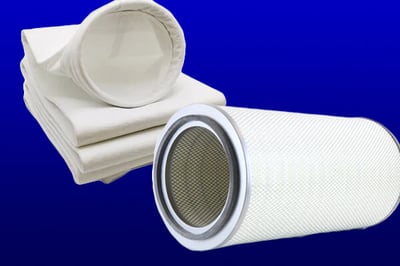 Industrial operations require safety, efficiency and regulatory compliance to achieve the highest level of success. Choosing between a bag filter and a cartridge filter is an important decision when it comes to industrial filtration and the dust collection systems your business or factory relies on.
Industrial operations require safety, efficiency and regulatory compliance to achieve the highest level of success. Choosing between a bag filter and a cartridge filter is an important decision when it comes to industrial filtration and the dust collection systems your business or factory relies on.
This article will explore the pros and cons of bag filters and cartridge filters and how business owners and plant managers should decide between the two given their unique needs.
The Importance of Industrial Air Filtration
First, it’s helpful to understand why industrial air filtration is essential. Industrial air filtration involves trapping and removing particulate matter from the air, which protects equipment, improves air quality for your labor force and helps to keep you compliant with safety regulations.
A factory manager has a lot to balance. From the efficiency of machines to the health of workers, a high-quality industrial air filtration system can be an important part of meeting those needs. A.C.T. Dust Collectors can fit into any industrial environment, and factory managers who are deciding between bag filters and cartridge filters should consider the following four factors:
- Application
- Efficiency
- Maintenance
- Budget
Bag filter vs. cartridge filter — which is right for your application? Let’s take a look at each option.
What Are Bag Filters?
Bag filters are air pollution control devices that remove particulates from dirty air released by manufacturing or industrial processes. These filters are usually long, cylindrical bags made of woven fabric as a filter medium.
As dirty air passes through the filter, the filter’s fabric traps the particulates that are mixed into the dirty air while allowing clean air to pass through. Periodically, the bags are cleaned by pulse jet.
Pros and Cons of Bag Filters
The big advantage of bag filters is their high dust-holding capacity, which makes them suitable for applications with high particulate volumes. They are also cost-effective over their lifecycle. Additionally, bag filters allow for higher air stream temperatures.
The main drawbacks include their significant space requirement for installation and the challenges associated with maintenance and bag replacement, which can lead to higher operational costs. Simply put, a bag filter is ideal for a factory with plenty of installation space.
What Are Cartridge Filters?
Cartridge filters consist of a cylindrical filtration media, which can be made from synthetic fibers or pleated paper. These filters are designed for easy installation and replacement, with the filter media housed within a metal or plastic casing.
Cartridge filters operate by directing dirty air through the filter media, trapping particles on the surface as the air passes through. They are often made using a pleated design to maximize the surface area of the filtration media.
Pros and Cons of Cartridge Filters
Cartridge filters are compact, highly efficient and particularly effective for capturing fine dust particles. Their design allows for a greater filtration area, reducing the size of the filter and making them ideal for space-constrained environments.
The initial costs of cartridge filters can be higher than bag filters, depending on the application. However, a cartridge filter is a great way to get a large amount of filtration media in a small space.
Which Industrial Air Filter Is Right for My Factory?
When comparing bag and cartridge filters, several factors come into play. Filtration efficiency is crucial; cartridge filters often provide superior performance for fine particles, while bag filters are better suited for larger particulate matter.
Bag filters are preferred in industries such as cement, steel and power generation, where large volumes of dust are generated. By contrast, cartridge filters are preferred in welding and general manufacturing, where air quality standards are stringent and the particulates are finer.
To sum it up, when selecting between a bag filter vs. cartridge filter, consider the following:
- Application
- Type of dust
- Space availability
- Budget
The physical characteristics of the particulate matter, such as size and abrasiveness, influence filter choice — especially in industries with greater regulatory compliance. Furthermore, space limitations can make cartridge filters more appealing, whereas budget constraints might dictate the use of more cost-effective bag filters.
We’re Here to Help
Choosing between a bag filter vs. cartridge filter is critical for optimizing industrial air filtration systems and creating a safer work environment for your employees. Both types of dust collection filters have their distinct advantages and limitations, making it necessary to consider specific operational needs, dust characteristics and dust collector safety requirements.
Informed decision-making is key to achieving optimal air quality control and operational efficiency in any industrial setting. Need more information? Book an appointment with one of our experts for specific advice about your setup. Contact us today.


























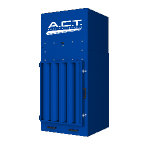
%20Collectors%20Image.png?width=143&height=143&name=ADC%20(Ambient)%20Collectors%20Image.png)
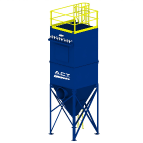

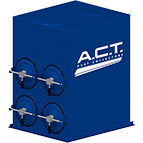
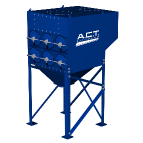
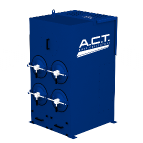


















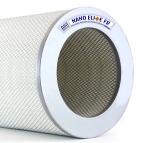


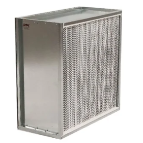
.png?width=240&height=91&name=ACT%20Dust%20Collectors%20Logo%20Solid%20White%202020%20(1).png)
.png?width=148&height=149&name=usa-manufactured-dust-collectors%20(1).png)